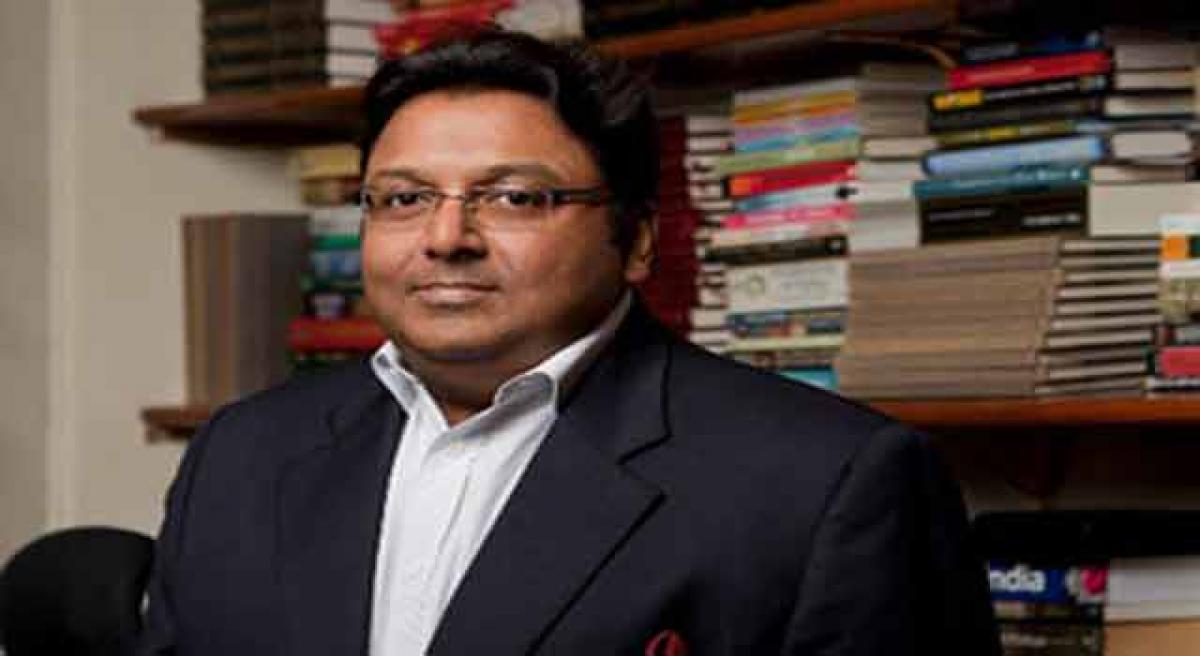Live
- 2024 on track to be hottest year on record
- PM Modi’s visit to Solapur: Women applaud ‘Double-Engine’ government’s initiatives
- Nagarkurnool MLA Dr. Kuchukulla Rajesh Reddy Campaigning in Maharashtra Elections
- Wife Kills Husband with Her Lover: Details of Veldanda Murder Case Revealed by SP Gaikwad
- Strict Action on Violations of Food Rights: Telangana Food Commission Chairman Goli Srinivas Reddy
- Smooth Conduct of Group-3 Exams with Strict Security Measures: Collector Badavath Santosh
- Delhi HC orders cancellation of LOC issued against Ashneer Grover, wife
- Shami’s absence a major blow for India in BGT, says Paul Adams
- Will organize protests at borders if attack on minority Hindus in Bangladesh not stopped: Bengal LoP
- Dutch Ambassador Marisa Gerard Meets Telangana CM A. Revanth Reddy in Delhi
Just In

Incredibly shuffling between post-partition Sialkot and the Pataliputra of 250 BC but focussing on the six decades of sub-continental upheaval since 1947, Ashwin Sanghi\'s latest book is a heady mix of past and present, history and mythology, business and politics and fact and fiction which, for the author, makes a narrative sound real.
Incredibly shuffling between post-partition Sialkot and the Pataliputra of 250 BC but focussing on the six decades of sub-continental upheaval since 1947, Ashwin Sanghi's latest book is a heady mix of past and present, history and mythology, business and politics and fact and fiction which, for the author, makes a narrative sound real.
"Using facts in one's fictional narrative makes the story sound real. If you must lie, then lie as close to the truth as possible. That's precisely what I try to do. Fact becomes interesting when it sounds like fiction. Fiction becomes that much more interesting when it sounds like fact," Ashwin Sanghi says.
‘The Sialkot Saga’ is Sanghi's fourth book and it is a gripping tale of two men hailing from different backgrounds whose pasts are connected by an ancient secret. Beginning with post-partition events, the book swings Pataliputra during the reign of Ashoka - where the secret lies - and then enters the lives of the protagonists.
Sanghi had to do a substantial amount of reading before he started plotting the story. It took around three years for him to complete the book with research and plotting taking about a year and the writing around 18 months.
"The ancient track involving Ashoka, Samudragupta, Harshvardhan, etc, was the easier bit. The more difficult part was in trying to get the contemporary history of India right," the author adds.
For Sanghi, combining history and mythology in fiction with business background was neither too difficult nor too easy, which he compared to a singer's attempt to sing in multiple voices.
"It's a little bit like a singer attempting to sing in three voices. If she tries to do it all at once, she will probably fail. On the other hand, if she records each voice independently and then mixes them, the result could be quite wonderful. That's what I did. I researched and wrote each track - ancient, historical and contemporary - as different stories and then overlaid them," Sanghi says.
The book includes many incidents, from the 9/11 attack on the World Trade Centre to the Jayaprakash Movement of the 1970s, from the 2002 Gujarat riots to the Kashmir insurgency since 1989 in the backdrop of the story. But why?
"When you stage a theatrical production, you need to change the background and props from time to time in order to give a sense of where the actors are. The incidents recounted in the book are precisely that," Sanghi replies.
"I have always maintained that the first paragraph of your story gets you your reader. The last paragraph of every chapter must compel your readers to turn the page. The last paragraph of the book must ensure that they look out for your next book," he adds.
Having written three books in the Bharat Series on theological, political and mythological thriller, Sanghi wanted to write a book that involves the world of Indian business for the longest time.
"I was born and brought up in a family of traders. I wanted to set this business story against the backdrop of post-independence India. The problem was that the project was so vast in scope and ambition that other projects kept coming in the way. As a result, completion of this book got held up on several occasions to make way for another book," he responds.
Talking on history becoming a trendsetter in the fictional world, the author says: "I never write with the intention of riding a wave. I believe that our Indian readership is maturing and that there will be space for all types of stories including historical fiction."
So, why the fourth book on fiction?
"Maybe it's because I'm a storyteller and there are too many stories inside my head! I wonder whether I will be able to narrate all of them before I die!" Sanghi shares.
Sanghi is currently working on his fifth book which will be a crime thriller, followed by another non-fiction title in the ‘13 Steps’ series and another one in the Bharat Series.
By:Somrita Ghosh

© 2024 Hyderabad Media House Limited/The Hans India. All rights reserved. Powered by hocalwire.com







